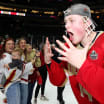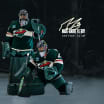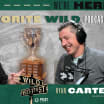ST. PAUL -- Not even three games into his Wild career, Marcus Foligno received a major reality check. It came via the right knuckle of Chicago Blackhawks forward John Hayden.
A summertime trade from Buffalo to Minnesota had given Foligno new confidence. In six seasons with the Sabres, Foligno had never played in a playoff game, and he was coming to a club in search of its sixth consecutive trip to the postseason. A brand new four-year contract had provided the 26-year-old and his wife Natascia -- expecting the couple's first child later this month -- with security away from the rink.
Foligno providing big boost when Wild needs it most
Forward has been one of Minnesota's most consistent players for the past six weeks

© Katlyn Gambill
Becoming Wild: Marcus Foligno


















